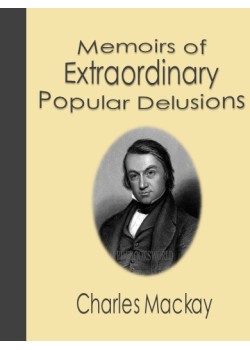
The two-volume set did not number the chapters.

The book has been reprinted often since.We present the second edition (1852) here.


His book, Memoirs of Extraordinary Popular Delusions, was first published in 1841 (London: Richard Bentley, New Burlington Street, Publisher in Ordinary to Her Majesty), with a promise of additional material “should these be favorably received.” Apparently the work was indeed favorably received, resulting in a substantially revised, two-volume second edition being published in 1852 (London, Office of the National Illustrated Library, 227 Strand). Paperback (September 30th, 2017): $7.Charles Mackay, Scottish poet, journalist, and editor was best known in his day for his verses, some of which were set to music.Publisher: Createspace Independent Publishing Platform Mathematician Andrew Odlyzko has pointed out, in a published lecture, that Mackay himself played a role in this economic bubble as leader writer in the Glasgow Argus, Mackay wrote on 2 October 1845: "There is no reason whatever to fear a crash". In later editions, Mackay added a footnote referencing the Railway Mania of the 1840s as another "popular delusion" which was at least as important as the South Sea Bubble. Scientist and astronomer Carl Sagan mentioned the book in his own discussion about pseudoscience, popular delusions, and hoaxes. Present-day writers on economics, such as Michael Lewis and Andrew Tobias, laud the three chapters on economic bubbles.

The subjects of Mackay's debunking include alchemy, crusades, duels, economic bubbles, fortune-telling, haunted houses, the Drummer of Tedworth, the influence of politics and religion on the shapes of beards and hair, magnetisers (influence of imagination in curing disease), murder through poisoning, prophecies, popular admiration of great thieves, popular follies of great cities, and relics. MacKay was an accomplished teller of stories, though he wrote in a journalistic and somewhat sensational style. The book chronicles its subjects in three parts: "National Delusions", "Peculiar Follies", and "Philosophical Delusions". Memoirs of Extraordinary Popular Delusions is an early study of crowd psychology by Scottish journalist Charles Mackay, first published in 1841.


 0 kommentar(er)
0 kommentar(er)
